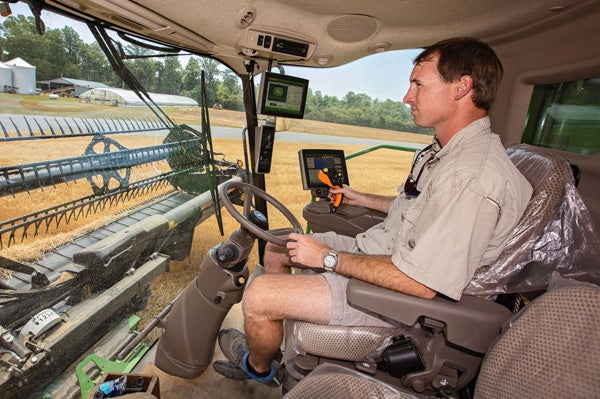THE STRESS
Griffin Farms, Inc. is an 1,800-acre, family-owned farm on the outskirts of Washington, North Carolina, that grows tobacco, corn, wheat and soybeans.
The farm employs 16 workers, but on a recent Tuesday afternoon the fields were quiet as scorching temperatures and drought conditions prevented important planting from being done.
“This year, we had so much rain early in the season that crops got planted a little later than we wanted. Then when it cleared up, it was a rush to get everything in. But then it dried up, so we stopped,” said Archie Griffin, who followed his father and grandfather into farming.

Third-generation farmer Archie Griffin operates a combine on his family’s farm in Washington, North Carolina. (Photos by Cliff Hollis)
“Right now, we currently haven’t done any planting work in two weeks because of the drought,” he said. “All of the corn that we rushed to get into the ground is on the verge of dying, and the forecast is not very optimistic.”
Griffin has a master’s degree in business administration from ECU, which he said has helped him to find ways for the family business to be more efficient and productive. However, Griffin said the host of issues that the region’s farmers faced over the last three or four years still has many farms on the brink.
“I’m hearing a lot of the stories. Rent prices have gone up, the price of land has gone up. Equipment, seed, fertilizers and chemicals, the price of everything has gone up. Yet the price that we receive [for our crops] has gone down,” Griffin said. “At the end of the year, if we don’t provide money, we don’t survive. And year after year it’s getting tougher and tougher. … Farmers are losing their land.”
And in many cases, the “rainy day funds” farmers set aside in anticipation of the occasional bad years haven’t been enough.
“You might have enough set aside to offset one, two, maybe three years. But I don’t know any business that can survive four to five years of continuous downturn and continuous decreased income,” Griffin said. “It’s tough and it’s causing farmers to sell off equipment and sell off land. They’re having to sell off things that they worked so hard, and for so many years, to get in order to survive.”
For most farmers, the stress to provide for their family is amplified by the need to provide for their workers and their families.
“Sometimes you feel like no matter what you do, nothing will ever suffice,” Griffin said. “There are days that you feel like just throwing your hands up in the air and saying, ‘I’m done’ and walking away from it. But then you remind yourself that you cannot do that. You have to continue forward and have to push on.”
